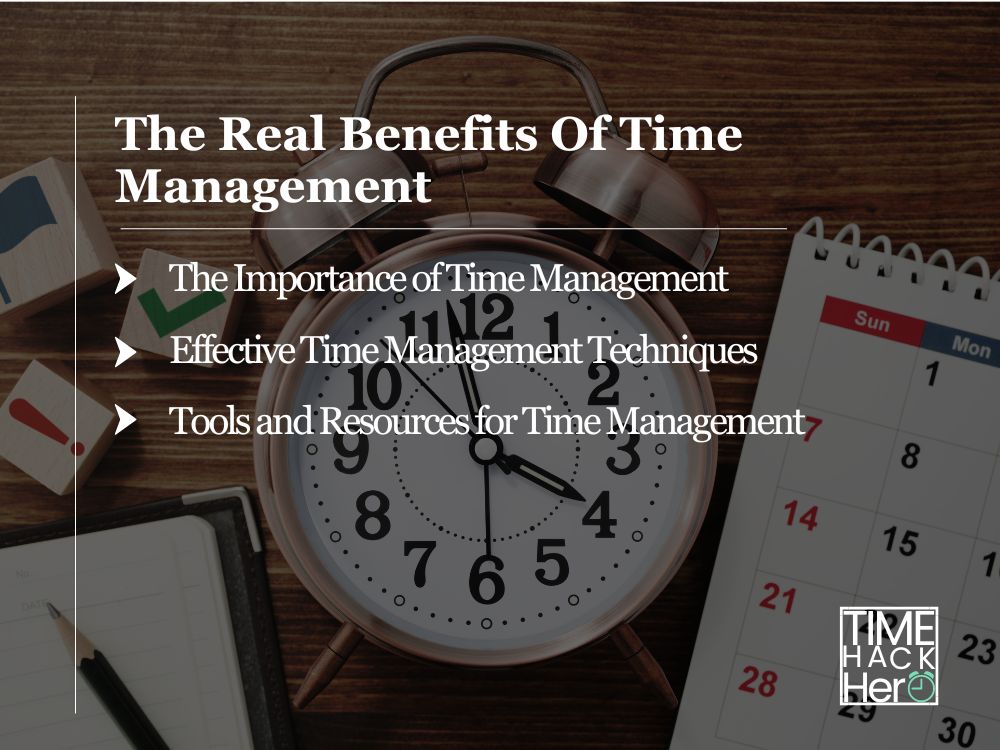Time management is a vital skill that, when mastered, can bring numerous benefits to both our professional and personal lives. Effective time management helps individuals organize their day-to-day activities, prioritize tasks, and strike a healthy balance between work and leisure. In an era of information overload and constant distractions, acquiring time management skills has become more important than ever.
One of the primary advantages of time management is increased productivity. By planning the activities and allocating time for each task, individuals can remain focused and complete their work efficiently. This enables them to stay on top of their to-do list and achieve their goals more effectively. Another significant benefit is reduced stress levels. As people learn to manage their time efficiently, they can avoid the anxiety that comes with tight deadlines and last-minute tasks.
Moreover, effective time management allows individuals to make the most of their available time, creating opportunities for personal growth and career development. By utilizing time wisely and setting realistic goals, individuals can enhance the quality of their work and attain greater success in their endeavors. Thus, mastering time management skills unleashes an individual’s full potential, paving the way for a fulfilling and rewarding life.
Table of Contents
The Importance of Time Management
Increased Productivity
Time management is crucial for increased productivity. When you effectively manage your time, you can better allocate resources to necessary tasks and prioritize your work based on deadlines and importance. By doing this, you can increase your focus and complete tasks more efficiently, ultimately leading to a higher level of productivity. Developing good habits, such as creating a task list and setting deadlines, can also contribute to improved productivity.
Reduced Stress Levels
Another significant benefit of time management is the reduction of stress levels. When you manage your time effectively, you can better predict and control your workload, allowing you to balance your professional and personal life better. This balance can ultimately lead to a decrease in stress levels. By organizing and planning your day, you can avoid last-minute scrambles and feelings of being overwhelmed, which can significantly contribute to a more relaxed and stress-free environment for you.
Effective Time Management Techniques
Time management is essential for achieving greater productivity, reducing stress, and maximizing opportunities for success. In this section, we will explore several effective time management techniques that can improve your overall effectiveness and well-being.
Setting Priorities
Establishing priorities is a fundamental aspect of effective time management. Consider the following tips for setting priorities:
- List tasks in order of importance: Identify critical tasks and allocate sufficient time to complete them.
- Apply the Pareto Principle (80/20 rule): Focus on tasks that contribute the most to your goals.
- Use time management tools like the Eisenhower Matrix to categorize tasks based on importance and urgency.
Creating Schedules
A well-structured schedule can help you stay focused and ensure that you allocate your time efficiently. Incorporate the following considerations when creating a schedule:
- Divide your day into blocks: Organize your day by dedicating specific time blocks to different activities.
- Make use of productivity techniques such as the Pomodoro Technique, which involves working in intervals and taking short, scheduled breaks.
- Allocate time for breaks and self-care: Ensuring that you have time to rest and recharge can help prevent burnout and maintain productivity.
Eliminating Distractions
Distractions can impede your focus and productivity. To minimize distractions:
- Create a dedicated workspace: Set up a workspace free from noise and other distractions.
- Limit digital interruptions: Silence your phone or use apps that block notifications during dedicated work periods.
- Utilize focus-enhancing techniques such as deep work or mindfulness to maintain concentration on tasks at hand.
Tools and Resources for Time Management
In this section, we will discuss various tools and resources that can help you effectively manage your time. We will focus on two categories: digital applications and time-tracking methods.
Digital Applications
There is a plethora of digital tools available to assist in managing and organizing your time. Here are some top picks:
- Calendar Apps: Applications like Google Calendar and Outlook can help you schedule appointments, set reminders, and plan your daily, weekly, and monthly tasks.
- Task and Project Managers: Platforms like Trello, Asana, and Todoist enable you to create tasks, prioritize projects, and collaborate with others to improve productivity.
- Note-taking Apps: Tools like Evernote and OneNote can assist you in capturing information, creating to-do lists, and quickly referencing essential notes.
Using these applications allows you to sync your tasks across multiple devices, ensuring that your information is available and up-to-date wherever you are.
Time-Tracking Methods
In addition to digital tools, there are several time-tracking techniques that can aid in managing your time and staying focused:
- Pomodoro Technique: This method involves breaking your work into short, focused intervals (usually 25 minutes) followed by a short break. After completing four intervals, take a longer break. This helps maintain focus and prevent burnout.
- Time Blocking: This technique involves allocating specific blocks of time to particular tasks or projects. By dedicating chunks of your day to specific activities, you can reduce multitasking and increase your focus.
- The Eisenhower Matrix: This prioritization method helps you categorize tasks as urgent, important, not urgent but important, or neither urgent nor important. By doing so, you can concentrate on what matters most and allocate your time accordingly.
Incorporating these time-tracking methods into your routine can improve your overall productivity and help you maintain a healthy work-life balance.
Long-Term Benefits of Time Management
Improved Work-Life Balance
Effective time management leads to a better work-life balance. By setting goals and prioritizing tasks, individuals can allocate time effectively, which allows them to accomplish work duties within the allotted period. This helps to maintain a healthy balance between personal and professional responsibilities, avoiding conflicts and stress related to competing demands.
Greater Opportunities for Success
Managing time efficiently opens doors to greater opportunities for success. With improved productivity comes the possibility of achieving exceptional results within the workplace, fostering professional growth and advancement. Additionally, well-managed time allows individuals to invest in learning, skill development, and network expansion, which are key components in career progression.
Enhanced Well-Being
Finally, time management is a crucial element in promoting overall well-being. By decreasing stress levels and providing a sense of control over daily activities, individuals experience improved mental and emotional health. Furthermore, effective time management creates space for enjoyable activities and hobbies, fostering a happier, more balanced lifestyle.









